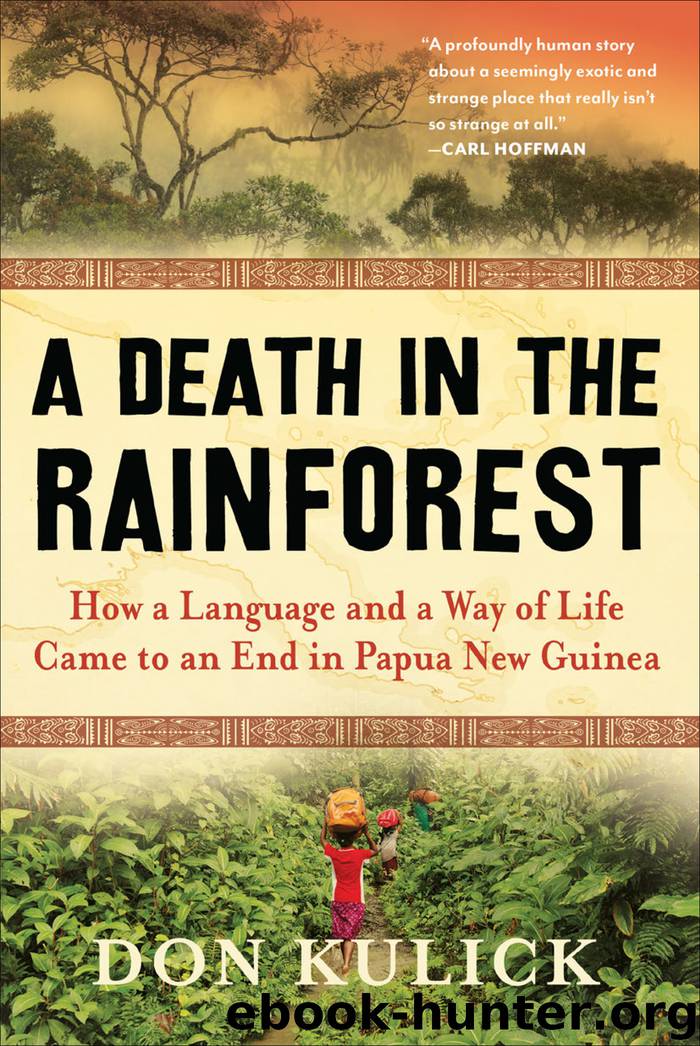A Death in the Rainforest by Don Kulick

Author:Don Kulick
Language: eng
Format: epub
Publisher: Algonquin Books
Published: 2019-06-20T16:00:00+00:00
10: matters of the liver
Before Papua New Guineans encountered white people, they didn’t have writing. Their history and traditions (and their languages) were all oral. They were embodied in art and ritual, remembered by old people and passed on in stories and initiation practices. Literacy arrived with colonialism, especially with missionaries who set about devising orthographies—alphabets, ways of writing—for local languages that were spoken by enough people to justify the considerable effort it took for the missionaries to learn the languages from scratch. They learned the languages to translate the Bible in order to facilitate conversion to Christianity. Later, when the colonial government established schools in various parts of the country, students were taught how to read and write in English, which was the national language of Australia, Papua New Guinea’s colonial caretaker.
Living far away from the concern of missionaries or the government, most villagers in Gapun never became literate. A few old men like Raya learned to read and write when they worked as plantation laborers in the 1950s. And for about fifteen years from the late 1970s until about the mid-1990s, a small government-run school did exist in the village of Wongan, which is a two-hour journey from Gapun—an hour’s walk through the swamp and then another hour of paddling across the mangrove lagoon in a dugout canoe. At its apogee in the mid-1980s, when I was living in Gapun for the first time, the school was staffed by three teachers who taught grades one through six. I spent several weeks in the school observing what went on, and I came away feeling depressed. The teachers—who were all men from villages along the Sepik River—could barely speak English, the language of instruction, and the pedagogy they used consisted entirely of repeating by rote. They wrote sentences (that were often ungrammatical and nonsensical) on fragments of blackboard in the front of classrooms that had been constructed out of poles and thatch, and they read aloud what they had written, ordering the kids who sat desultorily on bark benches to repeat back at them exactly what they had said.
Children from Gapun went to school only sporadically because they could see no real point in attending. I agreed with them—it was obvious that they acquired much more useful knowledge cavorting in the rainforest than they ever did sitting bored in a stuffy, dark classroom, where they got shouted at by ill-natured teachers and arbitrarily struck with a length of stiff cane for being “disobedient.” The teachers, furthermore, frequently went on strike because of non-school-related conflicts that they had with various villagers. For most of the 1990s, they stopped teaching, then two of them left. The one who remained in Wongan because he married a local woman hasn’t taught a day since 2009.
As far as I was ever able to tell, the children who attended Wongan Community School during the years it existed learned only two things. The first thing they learned was to be dissatisfied with their life in the village.
Download
This site does not store any files on its server. We only index and link to content provided by other sites. Please contact the content providers to delete copyright contents if any and email us, we'll remove relevant links or contents immediately.
Housekeeping by Marilynne Robinson(4438)
Papillon (English) by Henri Charrière(4265)
The Poetry of Pablo Neruda by Pablo Neruda(4100)
World without end by Ken Follett(3476)
TCP IP by Todd Lammle(3182)
Fluent Forever: How to Learn Any Language Fast and Never Forget It by Gabriel Wyner(3080)
The Rape Of Nanking by Iris Chang(2818)
How Proust Can Change Your Life by Alain De Botton(2810)
The Alchemist by Paulo Coelho(2690)
The Partner by John Grisham(2396)
Two lives by Helen Naylor(2297)
Hitler by Ian Kershaw(2195)
Yerma by Federico García Lorca(2063)
Sophie's World by Jostein Gaarder(2018)
Smilla's Sense of Snow by Peter Hoeg(1939)
Merriam-Webster's Pocket Dictionary by Merriam-Webster(1931)
Twilight of Idols and Anti-Christ by Friedrich Nietzsche(1893)
Il cavaliere inesistente by Italo Calvino(1855)
Deep Writing by Eric Maisel(1818)
